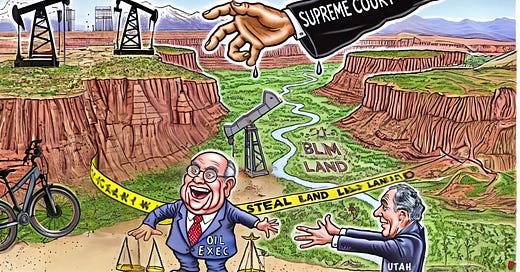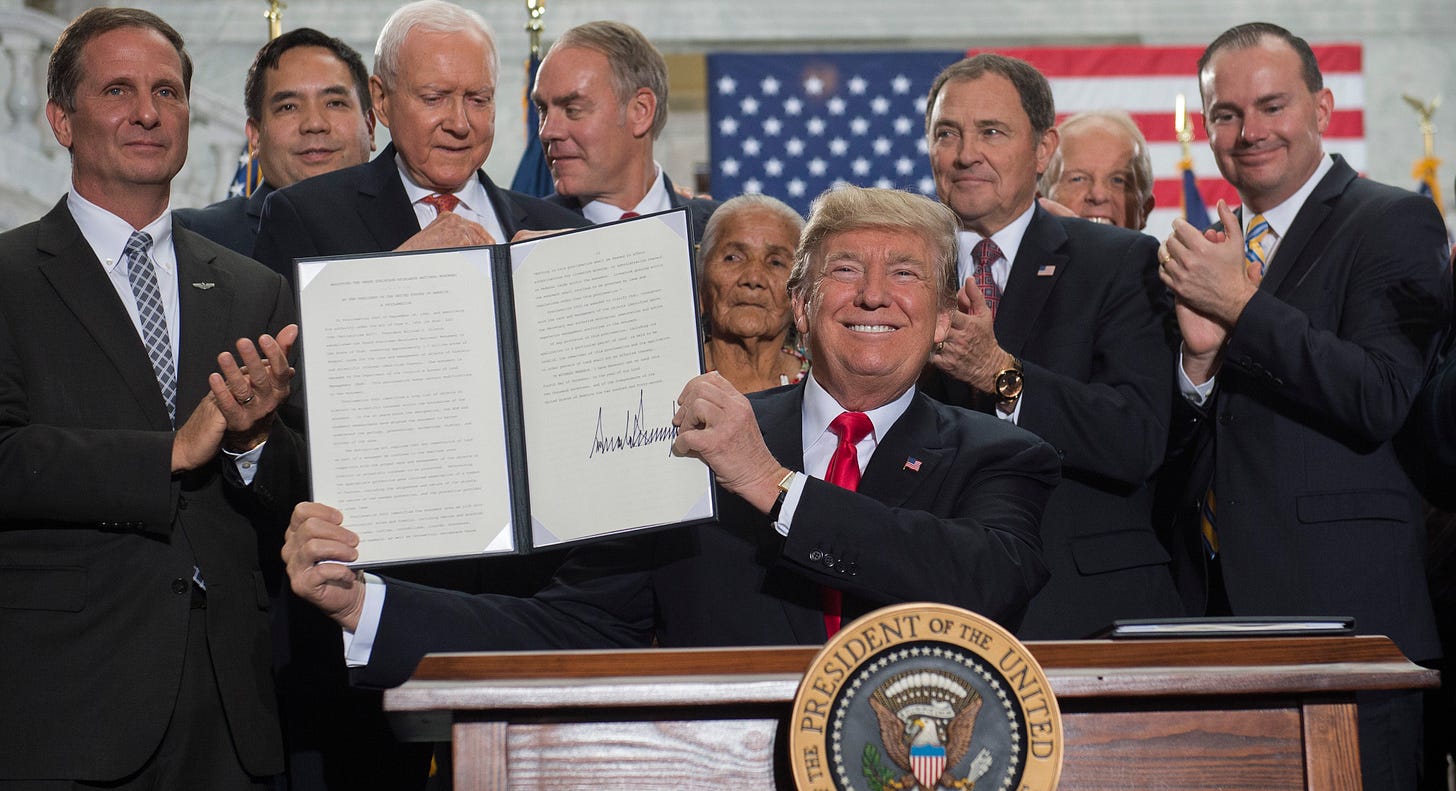Jim here, back with what I wish was better news. Alas, let’s dig in to the story that hit with a thud last week.
Here we go again. Utah’s officials have concocted another scheme to snatch away Americans public lands. This time, it’s a whopping 18.5 million acres of Bureau of Land Management (BLM) land—vast stretches of canyons, mountain ranges, and desert ecosystems teeming with wildlife, recreation opportunities, and irreplaceable natural beauty. Whether you hike, bike, or camp, these public lands belong to all of us. But those in power in Utah have better ideas.
Of course, this isn’t entirely new. For decades, Utah’s Republican leaders have been hellbent on wrenching federal lands out of public hands, opening them up to their friends in oil, gas, and mining —all under the guise of local control.
About Those Federal Lands
Federal land ownership in the West is a well-established aspect of U.S. history. Around 66% of Utah's total land is federally owned, with the BLM managing the largest share at about 42%, the U.S. Forest Service at 15%, and the National Park Service overseeing 5%, including iconic sites like Zion and Arches.
Despite Utah’s political grumblings, this is hardly unique—Nevada is over 84% federal land, Idaho around 62%, and Oregon about 53% to name a few. To be clear, these lands were never state property—they were federal from the start (dating back to when the land was a territory) and have never ceased being federal property. Utah's public lands belong to all Americans, not just state politicians or their energy-industry backers.
The idea that Utah could take control of these lands, however outlandish, has been a persistent goal for decades. Frustration with federal oversight, particularly regarding oil, gas, and mining regulations and management, has driven state leaders to push for reduced federal control, seeing these lands as lucrative resources for their allies in the energy sector.
Things hit a boiling point under the Trump administration. In 2017, President Trump gutted Bears Ears National Monument by 85%, a massive win for Utah’s energy-hungry elite, who had lobbied for this move for years. They tried to sell it to the public as a victory for “local control,” of course it was actually a gift for the oil, gas, and mining industries, and a slap in the face to conservationists and Indigenous groups who had fought to protect the sacred landscapes around Bears Ears.
Though President Biden subsequently restored the monument, Utah’s leaders had tasted blood and were convinced they could keep pushing to dismantle federal protections.
Now, their latest stunt is this 18.5-million-acre heist, spearheaded by Attorney General Sean Reyes. And they’re taking it straight to the Supreme Court. Why? It’s no secret that Utah's leadership sees the current conservative-majority Supreme Court as the most likely in history to entertain their extreme ideas. If they succeed, it would be open season on public lands, with the potential to turn all but the most iconic national parks over to state governments and their industrial allies.
Extraction At Any Cost
Governor Cox and AG Reyes argue this is a noble fight to “keep public lands in public hands.” A line that must have taken weeks of training to say with a straight face. They complain that federal oversight hurts Utah’s economy, preventing the state from taxing public lands or building infrastructure. Reyes even had the audacity to call federal land management a form of "colonialism," claiming Utah can’t "police or care for two-thirds of its own territory." Conveniently ignored in their bluster are the billions of dollars generated annually by these federal lands—$6.7 billion in 2021 alone, supporting 36,000 jobs. Oh, and by the way, Utah also gets $128.7 million annually in federal Payments in Lieu of Taxes (PILT) to make up for the lands they can’t tax.
If Cox, Reyes, and their cronies had their way, these lands would’ve been plundered by oil and gas companies long ago, transformed into wastelands of extraction. Instead, outdoor recreation—Utah’s renewable and sustainable golden goose—has flourished, pumping billions into the state economy every year. And don’t forget, when wildfires rage across these public lands, Utah is more than happy to let Uncle Sam foot the bill to fight them. Funny how federal management becomes palatable when it comes to firefighting or supporting Utah’s teeming national parks.
Legal Footing As Solid As Quicksand
Perhaps the most absurd and dangerous claim in this lawsuit is that the federal government has no right to own land indefinitely within a state’s borders. In fact, Utah agreed to this arrangement when it became a state in 1896.
“The people inhabiting said proposed State do agree and declare that they forever disclaim all right and title to the unappropriated public lands lying within the boundaries thereof.”
– The Utah Enabling Act of 1894
Now, Utah’s leaders want to rewrite history and violate their own statehood agreement just to enrich themselves and their industry friends. Reyes and his legal team are asking the Supreme Court to ignore the Constitution and overrule 150 years of settled law. Oh, and what does that pesky Constitution have to say about the matter?
“The Congress shall have Power to dispose of and make all needful Rules and Regulations respecting the Territory or other Property belonging to the United States.”
– Article IV, Section 3 of the U.S. Constitution
This case isn’t about local control—it’s about greedy politicians looking to pillage public lands for private profit and setting a dangerous precedent for other Western states to follow suit.
The Silver Lining
Fortunately this lawsuit doesn’t stand much of a chance even with the current Supreme Court. But Utah’s leaders know that. This is all about testing the waters—seeing if the Court might be open to dismantling federal land protections. If they don’t get what they want this time, they’ll bide their time and see which justices lean their way and which ones they need replaced to pull off their wild land-grab fantasy.
My Take
In a state so rich with natural beauty and cultural heritage it’s such a shame that it’s elected leaders aren’t more in tune with what truly makes Utah great. The state’s outdoor recreation economy is the envy of the world and yet all Utah’s officials seem to be interested in is the ability to plunder the very lands that sustainably enrich them in return for quick profit. Theodore Roosevelt decried these kinds of people:
Defenders of the short-sighted men who in their greed and selfishness will, if permitted, rob our country of half its charm by their reckless extermination of all useful and beautiful wild things… Our duty to the whole, including the unborn generations, bids us restrain an unprincipled present-day minority from wasting the heritage of these unborn generations.
– Theodore Roosevelt
I do believe that Utah will eventually come around to the idea that it’s probably smart to safeguard the state’s public lands from despoilment – particularly when you consider how vital they are to the state’s economy. Arizona’s elected officials originally opposed protecting the Grand Canyon and were furious when Theodore Roosevelt stepped in and saved the canyon from developers and mining. Of course now they recognize its value and are rightly proud of it. Utah’s leaders will likewise come around, it just won’t be the current ones.
Here’s the Deal On Paid Subscriptions
You love national parks. We love national parks. We love writing about our national parks. Do you love our writing about national parks enough to cover the next bundle of firewood?
Until Next Time
Fall is here! expect my next newsletter to talk leaves, crisp weather, and travel destinations.
Until next time.
– Jim








